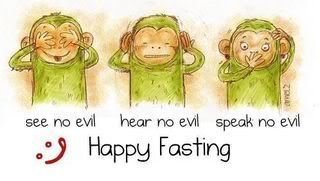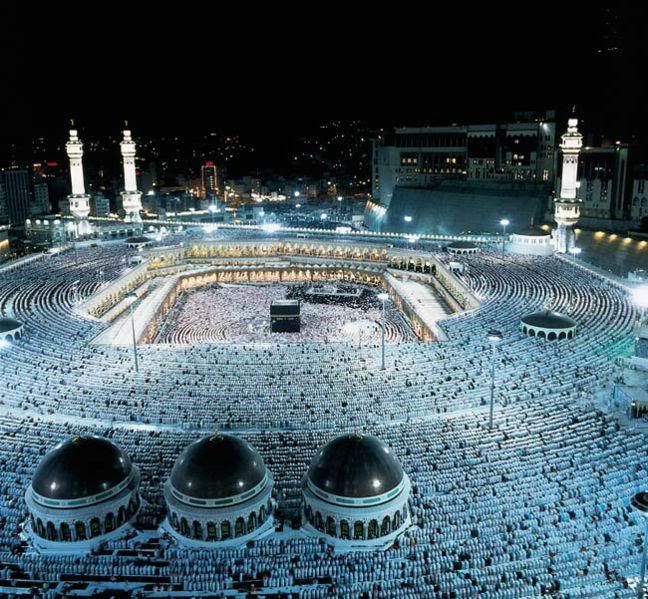The month of Ramadan approaches and even the Muslim of weakest faith jumps for joy at the thought of all the excitement and family gatherings.
Funny how people always think of Muslims struggling and dying of thirst during Ramadan, but few really understand the extreme excitement that Muslims experience during the Ramadan holiday. The closer Ramadan gets, the more excitement grows among devout Muslims.
Like many other religions, Islam involves a belief in angels; an angel plays a major role during the period leading up to Ramadan.According to Islamic belief, Ramadan is a time when Angel Gabriel will come to earth and shake the hands of Muslims who are successful in completing Layalat al-Qadr. Muslims eagerly anticipate the month of Ramadan, as they imagine the thrill of that moment when they encounter an angel who has six hundred wings and a wing span that reaches as far as the eye can see. In Islam, it's believed that this creation of Allah appears to Muslims with one message:"Well done, oh servant of Allah."
What Can a Muslim Expect During Ramadan?
Visions of Angel Gabriel aside, what else elicits excitement among Muslims as they worship and fasting during the month of Ramadan? Millions of Muslims will be running to do as many good deeds as possible during this period of time. In Islam, it's believed that Allah will reward the fasting person with many blessings and rewards; for Muslims, seeking the ultimate pleasure of Allah is indeed the goal.
Ramadan also features lots of food and family gatherings for meals the mark the end of each day's fast. It's believed that anyone who feeds a fasting person will receive the same reward as the person who receives the meal. So there are many family gatherings and many occasions when the Muslim will be invited to partake in the breaking of fast with others.
Good Deeds Increase the Excitement of Ramadan
For Muslims, one of the most exciting elements of Ramadan involves giving to charity and doing all sorts of good deeds. There is the required zakat (charity for the needy) that must be provided by Muslims each year, but many will do more than the bare minimum. Zakat is calculated based on the amount of money, silver and gold that's held for one year.
Over and above the required 2.5% zakat, is charity or "sadakah" which is also given to the poor and needy. Muslim families often compete with each other to see who can contribute the most to the needy within the community. In Islam, the silent charity is regarded as the best form of giving. It is also considered ideal to give all sadakah directly to the poor person. The purpose of sadakah is to ensure that the poor and the needy can enjoy Ramadan, along with the the more financially stable and wealthy individuals.
For many Muslims, there are few experiences that surpass the joy and excitement of witnessing the face of a Muslim who receives a gift, like a package of food or money. The month of Ramadan is a time of fellowship and unity among members of the Islamic community.
Family Gatherings at Ramadan
Although all family gatherings bring excitement and joy, they do cause many fasting Muslims to feel over-stuffed and lazy; it's comparable to the feeling that many Americans experience following a large Thanksgiving dinner. So while it may be tempting to relax following a meal and gathering, Muslims believe it's important to keep up with religious activities like late night prayers and other forms of worship. It is also forbidden to overeat after a day of fasting as this would take away from the reason for fasting. Fasting is intended to serve as a reminder that there are those who must go without food and other necessities.
While many Muslims are invited to family gatherings, it is each person's responsibility to return the favor. So many Muslims make plans to invite loved ones over for a dinner that is specifically prepared to reap the reward that they believed Allah has promised. It's believed that when inviting others over for a dinner to break the fast, the host should present a plentiful meal with a few delicacies so as to make the fasting person say a dua (supplication) for the host.
Sending Free Ramadan Cards to Family and Close Friends
The internet has served as a way to increase the excitement of the blessed Ramadan season, as Muslims can now send e-cards via the web. By simply a click of a button or mouse, a card is sent to all loved ones. Flashing and shinning Ramadan cards showing mosques, crescent moons and stars. It is indeed part of the excitement of Ramadan to send everyone a greeting card. Here are some links to make the job easy:
For the Islamic community, Ramadan and all of the associated excitement is regarded as a gift from Allah. Ramadan is a month of fasting, prayer and giving praise to Allah, The Creator. Muslims believe the reward is heaven, having sins forgiven and the future meeting with Allah.




